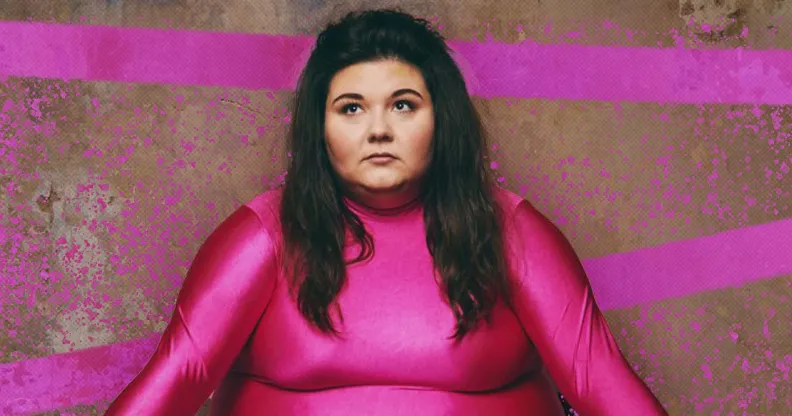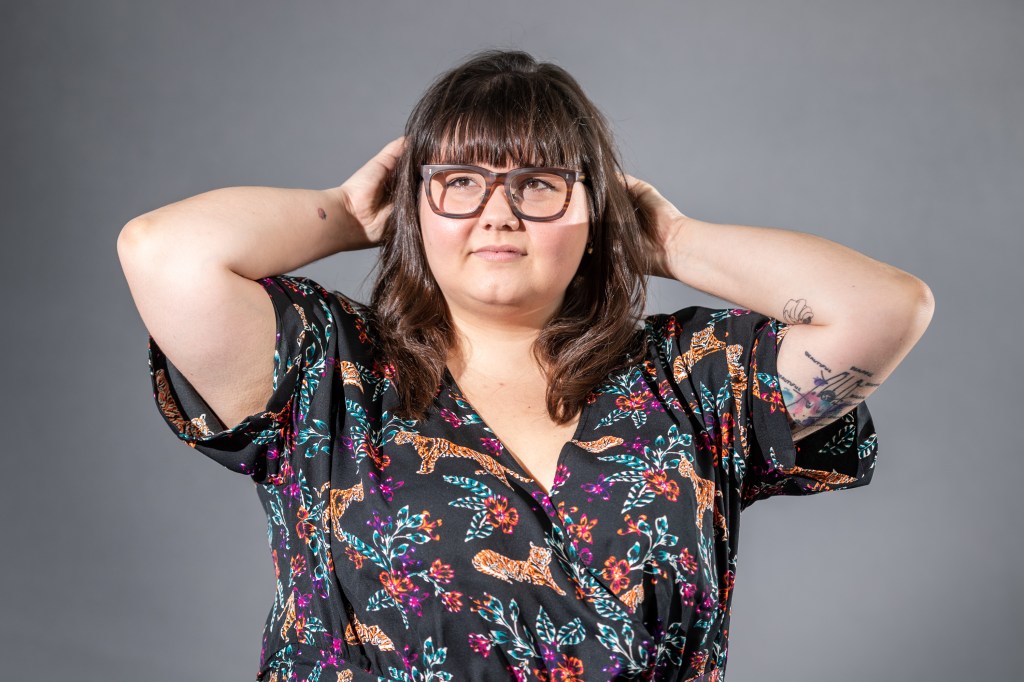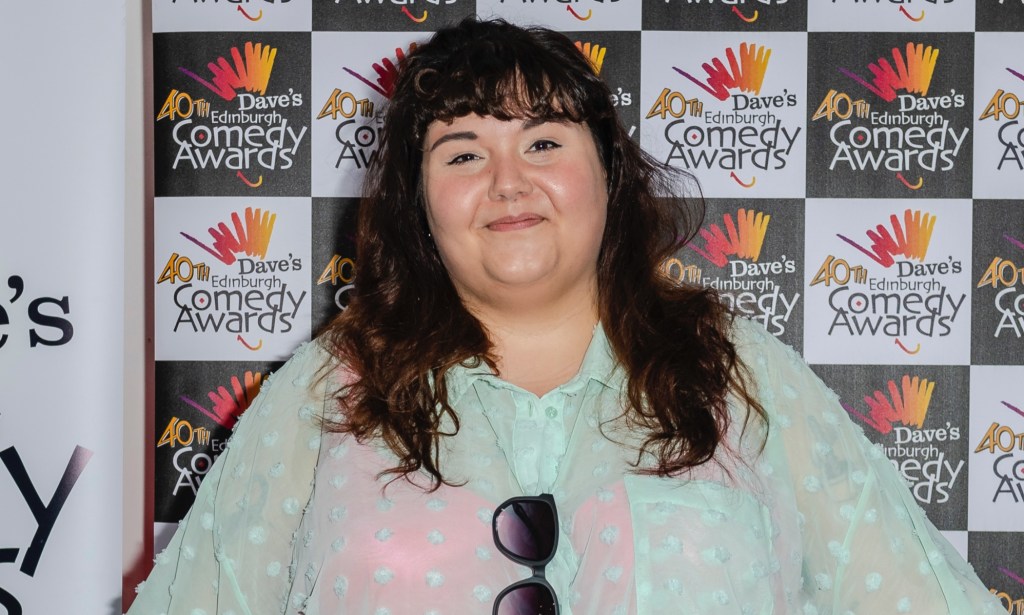Sofie Hagen on returning to Edinburgh Fringe, confronting their queerness and transphobia in comedy

Sofie Hagen performs their new Edinburgh Fringe show BANGLORD at the Edinburgh Fringe. (Sofie Hagen)
Award-winning comedian and author Sofie Hagen hasn’t had sex in eight years – and her latest Edinburgh Fringe stand-up show Banglord endeavours to find out why.
Since bursting on to the stand-up comedy scene 13 years ago, London-based Danish comic Hagen has gone from strength to strength. She won the Edinburgh Festival best newcomer award in 2015 and went on to co-host hit podcasts such as The Guilty Feminist, as well as embarking on a world tour and having her first book, Happy Fat, published.
At the same time, she has been on a personal voyage to understand her “multitudes”. Not an easy task as a non-binary, pansexual, neurodivergent, fat activist in a world littered with “pathetic” transphobes and a woeful lack of mainstream representation.
The comedian tells PinkNews about her “sexy, sleazy, sweaty, frisky show” as well as speaking about intersectionality and supporting LGBTQ+ fellow joke-tellers.
How is your show going so far?
It’s a very different show to what I’m used to. I reveal a lot of things that I don’t really know how to talk about. I talk about a comedian who was a bit of an ar**hole to me but I don’t name him because it still feels like a weird thing to do… we’re all up the Fringe together.
I want to give the gift of gossip. We’re all taught to be very quiet all the time about the things that others have done to us. So, the show risks a lot by talking about this much-more-famous comedian.
I also discuss how I have been an ar**hole which feels really good. In the queer culture I see around me, [there] is this idea that because we’ve needed representation for so long, when we do get it, there’s a tendency to idolise it.
Suddenly there’s a lot more pressure on queer people, trans people etc to be better than everyone else, to be the bravest and the best. I like talking about my own flaws and being like, “Obviously, I’ve been a d*ckhead, because we’ve all been d*ckheads.”

What inspired you to make sex and sexuality the topic of this show?
All my shows are about something that I’m going through at that moment in time. I’m going through this journey trying to reconnect with my own sexuality because I haven’t had sex in almost eight years. Over the past year, I’ve asked myself why.
When I sat down and wrote a show, I thought: “I have to talk about all these things that I’ve been doing, to try to learn about my sexual past.”
It’s so refreshing to have a show focusing on sex and sexuality by someone who is unapologetically pansexual, non-binary, fat and neurodiverse. What does it mean to you to offer this fresh perspective?
Because I’m just me, I have to remind myself it isn’t seen as normal to contain multitudes. I still have to figure out a way of mentioning on stage that I’m non-binary because I forget that people don’t just know. I’m still weirded out when people call me a woman, but then I realise that’s what they see.
It’s the same with my queerness. When I grew up, I just assumed that being straight meant wanting to be with all of the genders. Everyone was telling me I was a straight woman, so I thought: “I guess being a woman means not feeling like a woman at all. And being straight means I want to kiss Christina but I have to choose a man.”
How much has your relationship with your sexuality and gender identity informed your comedy?
I’m very late into queer experience. The majority of my experiences have been with cis men. I have this insecurity around my own queerness so when I say I’m queer, I feel I don’t have the evidence to back it up. I feel a bit apologetic about it.
I was raised by television, essentially, while living in a very narrow-minded, tiny Danish town. The Ultimatum: Queer Love [a Netflix reality show which came out this year] was the first time I saw queerness that wasn’t fictional. I realised that that’s how you go on a date and end up with a woman.
How do the other aspects of your identity intersect with your queerness?

I can’t separate my fatness from my queerness. It’s all connected. Fatness is such a massive part of how the world reflects back at you. So, anything to do with attraction, femininity, masculinity, sex and sexuality, everything is seen through the lens of fatness. People see a fat person before they see gender, before they see anything else.
If I say I’m fat and queer, that’s like saying: “Because I’m fat, I just can’t find a man so I’m going to try to find a woman.” Or that I’m so desperate that I can’t have just one choice.
When I say I am non-binary, they are like: “Because you’re too fat to feel like a pretty woman.” It’s difficult knowing how to be fat and queer. I need another reality TV series to show me how to do that.
Unfortunately there are comedians who make anti-trans jokes and some Fringe comedians have complained about being “cancelled”? Do you feel safe on the comedy scene?
I check line-ups before I do a show with other comedians because there are people in comedy who just make me feel inherently unsafe. It’s not even necessarily the ones who are, on paper, the most right wing. I respect them so little that they can’t make me feel unsafe.
The problem is the people who try to live in the middle. The ones who say: “Oh, but I offend everyone,” then sarcastically make jokes that punch down. It is still causing as much harm as if they were directly right wing.
There will be people sitting in the audience repeating those jokes. If you’re going to be a right-wing, edgy comedian, wear it on your chest. LGBTQ+ rights isn’t a matter of opinion. It is really f**king serious and people are dying. People are having their rights stripped away and losing access to medical care.
Everyone can write offensive jokes. It’s the first thing new comedians do because it is so easy to be offensive. Holy s**t. It’s easy. That’s why some comedians are offensive, because they can’t write better jokes. It’s pathetic.
What is your approach to naming and shaming the terrible comedians you come across?
As soon as you name them, they get what they want: notoriety. Then, all of a sudden, they post that they’re being attacked, they’re being silenced, they’re being censored. Their names are not even worth saying.
A former friend told a very transphobic joke and I messaged him asking what the f**k he was doing. He replied: “I don’t have an agent. I don’t go on TV. I don’t do radio. I don’t have any followers. What else should I do?”
He literally admitted to doing right-wing comedy so that he would be famous. Now he is more successful than he ever has been.
Among the terrible news, there is also hope. Edinburgh Fringe has been a home to countless LGBTQ+ performers, hasn’t it?
I’ve seen stuff in Edinburgh that was life-changing. I never realised comedy was a hub for the alternative, for the queer, until very recently. Now, I’ve realised there’s something inherently queer about it because you have to be vulnerable. And vulnerability is a strength for many queer people.
What message would you have for aspiring LGBTQ+ comedians trying to find their voice within the comedy scene?
I don’t think comedy will ever be a safe space. I don’t believe that safe spaces really exist. I think it has been very safe for cis straight men. They’re reacting so violently now because it no longer feels like what they thought was safe.
Hopefully, you will find gigs where there isn’t loads of homophobia, biphobia, transphobia, xenophobia, misogyny, but it’ll still be really difficult. I’ve seen people being misgendered in reviews. I’ve seen people make weird comments on people’s sexuality or gender.
But remember, there is such a lovely queer circuit and a lovely queer audience out there who are extremely supportive.
Banglord runs at the Edinburgh Fringe until 27 August. Tickets available here.
How did this story make you feel?

